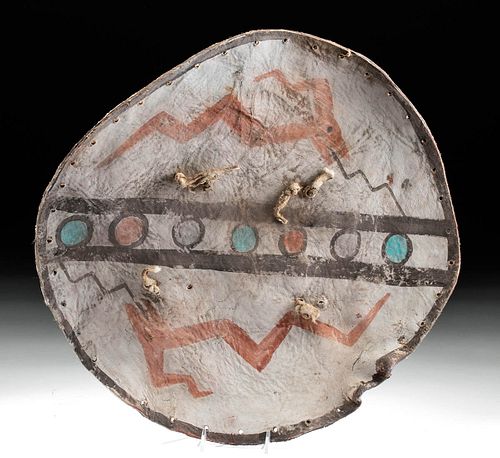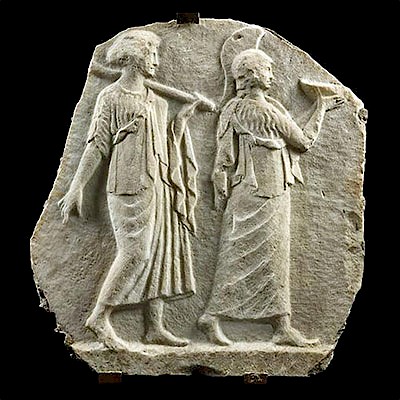19th C. Pueblo Tewa Painted Hide Shield w/ Avanyus
Lot 126c
About Seller
Artemis Fine Arts
686 S Taylor Ave, Ste 106
Louisville, CO 80027
United States
Selling antiquities, ancient and ethnographic art online since 1993, Artemis Gallery specializes in Classical Antiquities (Egyptian, Greek, Roman, Near Eastern), Asian, Pre-Columbian, African / Tribal / Oceanographic art. Our extensive inventory includes pottery, stone, metal, wood, glass and textil...Read more
Estimate:
$50,000 - $70,000
Absentee vs Live bid
Two ways to bid:
- Leave a max absentee bid and the platform will bid on your behalf up to your maximum bid during the live auction.
- Bid live during the auction and your bids will be submitted real-time to the auctioneer.
Bid Increments
| Price | Bid Increment |
|---|---|
| $0 | $25 |
| $300 | $50 |
| $1,000 | $100 |
| $2,000 | $250 |
| $5,000 | $500 |
| $10,000 | $1,000 |
| $20,000 | $2,500 |
| $50,000 | $5,000 |
| $100,000 | $10,000 |
| $200,000 | $20,000 |
About Auction
By Artemis Fine Arts
Feb 13, 2020
Set Reminder
2020-02-13 10:00:00
2020-02-13 10:00:00
America/New_York
Bidsquare
Bidsquare : Exceptional Antiquities, Asian, Ethnographic
https://www.bidsquare.com/auctions/artemis-gallery/exceptional-antiquities-asian-ethnographic-4848
An important one-day auction featuring museum-worthy examples of Egyptian, Greek, Roman, Etruscan, Near Eastern, Far East / Asian, Pre-Columbian, African / Tribal, Oceanic, Native American, Spanish Colonial, Russian, Fossils, Ancient Jewelry, Fine Art, so much more! Artemis Fine Arts info@artemisgallery.com
An important one-day auction featuring museum-worthy examples of Egyptian, Greek, Roman, Etruscan, Near Eastern, Far East / Asian, Pre-Columbian, African / Tribal, Oceanic, Native American, Spanish Colonial, Russian, Fossils, Ancient Jewelry, Fine Art, so much more! Artemis Fine Arts info@artemisgallery.com
- Lot Description
Native American, southwestern United States, Pueblo Indians, Tewa group, ca. 19th century CE. A beautiful war shield made from a circular section of thick buffalo hide. The discoid shield has a thick periphery lined with dozens of perforations meant to display additional ornamentation, six knotted leather straps that shape a pair of hand holds, and a thick layer of desiccated mud on the verso to strengthen the overall design. The front of the shield bears a white ground that is decorated in polychrome motifs in hues of turquoise, vermilion, black, and lavender. An enclosed panel of black-bordered circles separates two red-painted avanyus, serpentine Tewa deities with zigzagging bodies that are symbolic of lightning strikes. The serpentine design of the Avanyus suggests that it is analogous to Quetzalcoatl, the Mayan feathered-serpent deity of similar symbolism. An incredibly rare example of fine Pueblo armaments! Size: 17" W x 16.75" H (43.2 cm x 42.5 cm)
Shields like this example were typically used in combat or wartime situations because of the thickness the buffalo hide provided in protecting the wielder. Dancing shields were of a smaller form and made from thinner material so the performer could easily maneuver the shield, and buffalo hide enabled the warrior to protect themselves from incoming projectiles as well as clubs swung by an opponent.
For a stylistically similar example of a smaller form, please see Sotheby's, New York "American Indian Art Including Property from the Estate of Paul Peralta-Ramos" auction (June 24, 2004, lot 146).
Provenance: private Glorieta, New Mexico, USA collection, acquired in 2011 to 2012; ex-Dick Hewlett collection, Albuquerque, New Mexico, USA
All items legal to buy/sell under U.S. Statute covering cultural patrimony Code 2600, CHAPTER 14, and are guaranteed to be as described or your money back.
A Certificate of Authenticity will accompany all winning bids.
We ship worldwide and handle all shipping in-house for your convenience.
#152226Two original leather handle straps missing. Slight bending to overall form commensurate with age, with minor fading and abrasions to original pigmentation, nicks to front, peripheries, and verso, otherwise intact and excellent. Light earthen deposits throughout and great traces of original pigment across obverse.Condition
- Shipping Info
-
All shipping is handled in-house for your convenience. Your invoice from Artemis Gallery will include shipping calculation instructions. If in doubt, please inquire BEFORE bidding for estimated shipping costs for individual items.
-
- Buyer's Premium



 EUR
EUR CAD
CAD AUD
AUD GBP
GBP MXN
MXN HKD
HKD CNY
CNY MYR
MYR SEK
SEK SGD
SGD CHF
CHF THB
THB














